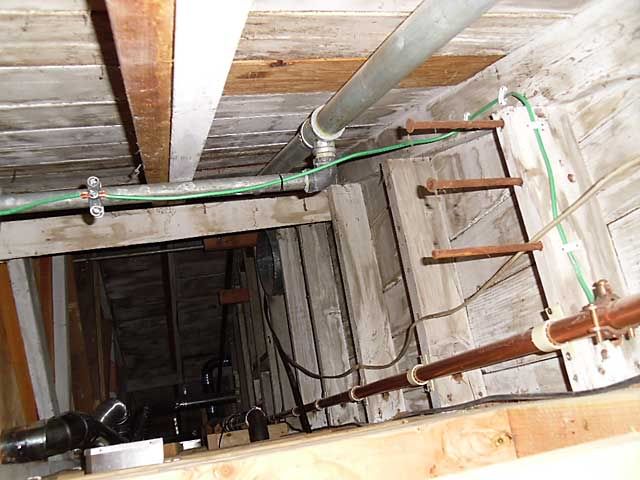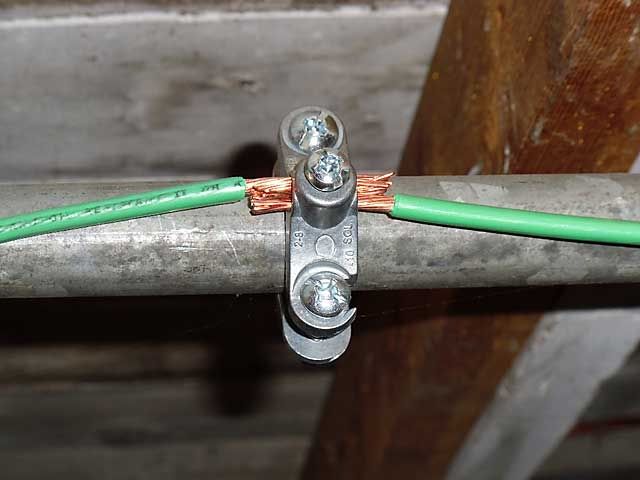I got called in to a residential rennovation to run network, phone, and some "smart" lighting circuits. A well-seasoned crew were doing the bulk of the construction, including a number of new electrical circuits and a sub-panel upgrade. I'm sort-of the "new" guy (3 years with the company) and I rarely work with this crew.
First thing I noticed on the job site was that the sub-panel (that had been purchased, but not yet installed) was Main Lugs Only. So I gave a call to the project manager and told him they would need a new panel with a main breaker.
Later, a satellite dish was added and the installer routed the cables in a jumbled mess and had placed two splitters in a location next to the electrical sub-panel which would have resulted in the splitters being sealed behind sheetrock. Since I was putting in a central wiring panel for the network & phone, I suggested that I should also relocate the sattelite feeds and CATV runs to that location, not just to keep things neat and organized, but also to allow flexibility if the owner decided to change which rooms the dish receivers would be located in (or if he wanted to add another). I was told to do it.
When I was doing that work, I discovered that the satellite mast and the feed cables were not grounded. I was looking at a way to ground them to the grounding bar in the electrical subpanel when I noticed that the GEC and GES were not code compliant. The GEC was a #8 stranded wire that left the 125A service sub-panel and was landed on a natural gas pipe (galvanized) above the ceiling, using a weaver clamp. A second #8 stranded wire was placed in that same weaver clamp connection on the gas pipe and routed to the water supply pipe (copper), also in the ceiling; the GEC was connected to the water pipe with a second weaver clamp. There were no other electrodes.


I counted five code violations:
250.52(A)(1): Connections to water pipe must be within first 5ft from where it enters building
(in this case, it was 13ft)
250.52(B)(1): Gas pipe not permissible as a GES electrode
250.53(D)(2): Supplemental electrode(s) required
250.68(A): Connections must be accessible
(in this case, they will be inaccessible after the sheetrock is installed)
250.70: Only one conductor per clamp unless listed for more
So while I was talking to the project manager about the satellite dish issues, I mentioned that the sub-panel grounding was not code compliant. At that time, I didn't know who had done the work. The manager told me that the electrical had already passed inspection, but he would discuss my concerns with "Joe" (not his real name) who had done the install. I rarely work with Joe, but I know him: he happens to be the senior man on their construction team. Crap... I just realized that this was not going to go well. So I tried to persude the manager not to talk it over with Joe, hoping he would just let me correct the problems. But the genie was already out of the bottle. This was on Friday morning (with the manager starting his two weeks vacation as the end of the day).
So Monday, I was on the job site finishing my work and Joe drives up. Needless to say, he was not happy and proceeded to rip me a new one. He told me in no uncertain terms to just do my own job and keep out of the work of others. He also told me that his work had already passed inspection and that only ONE person's opinion mattered: the inspector's. Of course, nothing was fixed or changed. So the only thing I accomplished by pointing out the errors was to screw up my working relationship with Joe.
In retrospect, I realize I did not "play" this very well. I should have asked around to find out who did the work first. But then what? If I had tried to be diplomatic and raised the issues directly with Joe, he still would have told me that the work had already passed inspection and to mind my own business. As far as I can tell, it was a no-win situation.
First thing I noticed on the job site was that the sub-panel (that had been purchased, but not yet installed) was Main Lugs Only. So I gave a call to the project manager and told him they would need a new panel with a main breaker.
Later, a satellite dish was added and the installer routed the cables in a jumbled mess and had placed two splitters in a location next to the electrical sub-panel which would have resulted in the splitters being sealed behind sheetrock. Since I was putting in a central wiring panel for the network & phone, I suggested that I should also relocate the sattelite feeds and CATV runs to that location, not just to keep things neat and organized, but also to allow flexibility if the owner decided to change which rooms the dish receivers would be located in (or if he wanted to add another). I was told to do it.
When I was doing that work, I discovered that the satellite mast and the feed cables were not grounded. I was looking at a way to ground them to the grounding bar in the electrical subpanel when I noticed that the GEC and GES were not code compliant. The GEC was a #8 stranded wire that left the 125A service sub-panel and was landed on a natural gas pipe (galvanized) above the ceiling, using a weaver clamp. A second #8 stranded wire was placed in that same weaver clamp connection on the gas pipe and routed to the water supply pipe (copper), also in the ceiling; the GEC was connected to the water pipe with a second weaver clamp. There were no other electrodes.


I counted five code violations:
250.52(A)(1): Connections to water pipe must be within first 5ft from where it enters building
(in this case, it was 13ft)
250.52(B)(1): Gas pipe not permissible as a GES electrode
250.53(D)(2): Supplemental electrode(s) required
250.68(A): Connections must be accessible
(in this case, they will be inaccessible after the sheetrock is installed)
250.70: Only one conductor per clamp unless listed for more
So while I was talking to the project manager about the satellite dish issues, I mentioned that the sub-panel grounding was not code compliant. At that time, I didn't know who had done the work. The manager told me that the electrical had already passed inspection, but he would discuss my concerns with "Joe" (not his real name) who had done the install. I rarely work with Joe, but I know him: he happens to be the senior man on their construction team. Crap... I just realized that this was not going to go well. So I tried to persude the manager not to talk it over with Joe, hoping he would just let me correct the problems. But the genie was already out of the bottle. This was on Friday morning (with the manager starting his two weeks vacation as the end of the day).
So Monday, I was on the job site finishing my work and Joe drives up. Needless to say, he was not happy and proceeded to rip me a new one. He told me in no uncertain terms to just do my own job and keep out of the work of others. He also told me that his work had already passed inspection and that only ONE person's opinion mattered: the inspector's. Of course, nothing was fixed or changed. So the only thing I accomplished by pointing out the errors was to screw up my working relationship with Joe.
In retrospect, I realize I did not "play" this very well. I should have asked around to find out who did the work first. But then what? If I had tried to be diplomatic and raised the issues directly with Joe, he still would have told me that the work had already passed inspection and to mind my own business. As far as I can tell, it was a no-win situation.
Last edited:
